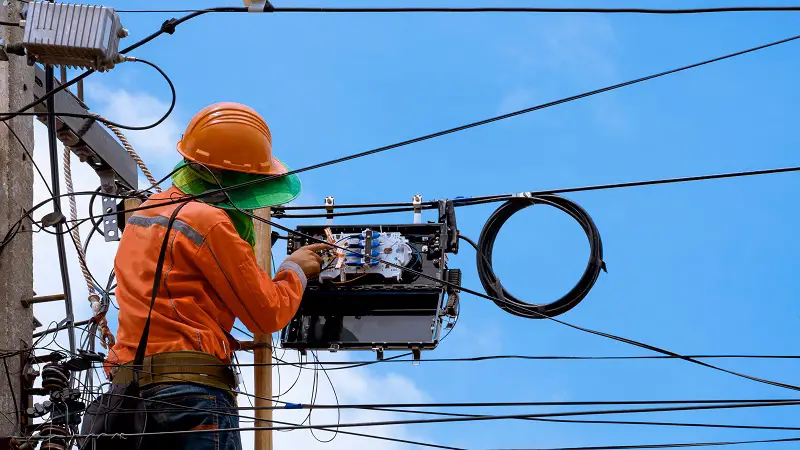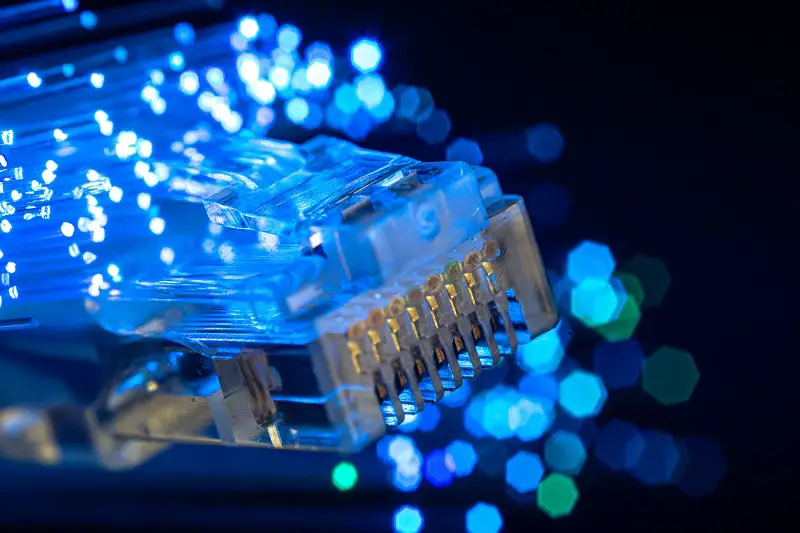If you’ve been researching your internet service options, you’ve probably come across the terms “fiber internet” and “wireless broadband.” These are two internet access technologies for delivering high-speed broadband internet, and both are options for anyone who needs reliable broadband service. However, they’re quite different in performance and applications, so it’s essential to understand how each one works and where each excels.
Deciding between fiber internet and wireless broadband? Ahead, we’ll compare these two internet access technologies and look at the pros and cons of each.
What is fiber internet?
Fiber optic internet is an internet access technology that transmits data via ultra-thin strands of glass bundled into fiber optic cables. A device in your home or business called an optical network terminal (ONT) encodes your data into split-second light pulses, then transmits it through a nationwide network of these fiber optic cable lines.
A high-speed fiber connection is the best broadband internet access option across the board, from reliability to download and upload speeds. The upload speeds are especially important. While most other internet access technologies have upload speeds much slower than their download speeds, fiber upload and download speeds are usually close to symmetrical.
Practically any home or business can benefit from a fiber optic connection, but fiber is a particularly good choice for applications like working from home or online gaming. Remote workers and gamers need stable, low-latency connections with fast upload speeds, and that’s what fiber optic internet does best. Moreover, the superb reliability of fiber service makes your internet connection far less vulnerable to weather events and other sources of interference.
What is wireless broadband?
The most common and most correct definition of “wireless broadband” refers to fixed wireless broadband. This internet access technology uses antennas attached to cell phone towers to broadcast 4G LTE and 5G wireless signals to the surrounding area. A receiver unit in your home, known as customer premises equipment (CPE), picks up these signals and allows you to connect devices in your home to the wireless network. (You’ll still need a router to create a WiFi network.)
Wireless broadband technology generally doesn’t boast the speed or performance of fiber or cable internet. Instead, its strength is in its adaptability. Service providers can deploy fixed wireless broadband almost anywhere, and it’s faster and more reliable than similar alternatives like satellite internet. This makes fixed wireless a critical lifeline for people in rural areas without easy access to other types of internet service.
Depending on your area, fixed wireless can use either the 4G LTE or 5G spectrum. 4G LTE is the slowest but has the greatest range, while millimeter-wave 5G is extremely fast but typically available only in dense urban areas. The cost of fixed wireless also typically varies according to the spectrum your ISP uses, with high-speed 5G offering better performance but a higher price point.

Fixed wireless broadband vs. WiFi
You might also hear the term “wireless broadband” used to mean a broadband connection delivered via WiFi. This usage isn’t necessarily wrong, but it can be somewhat misleading, especially if you’re trying to make a comparison like fiber internet vs. WiFi.
That’s because WiFi itself isn’t an internet access technology; it’s a way to create a local area network that connects your devices to an existing internet connection. Think of fiber or fixed wireless as a highway, and WiFi as the on-ramp that lets you get on.
Broadband WiFi is undoubtedly essential for any modern home or business. However, it’s important to know the differences between the underlying technologies that power your WiFi connection so you can choose the one that’s right for your use cases.
Fiber internet vs. wireless broadband: similarities and differences
- Similarities
- Both fiber and fixed wireless are internet access technologies.
- Both fiber and fixed wireless provide high-speed broadband service that’s suitable for homes and businesses.
- Both fiber and fixed wireless are currently available from a wide range of different ISPs.
- Differences
- Fiber delivers substantially faster speeds and lower latency than fixed wireless broadband, especially on the upload side.
- Fixed wireless broadband is much easier to install in areas where fiber deployment may not be cost-effective.
- Fiber can accommodate many more users simultaneously than fixed wireless broadband can.
- Fiber is immune to most electronic interference, while fixed wireless broadband is subject to many different kinds of radio interference.
- Fixed wireless typically costs less than fiber thanks to its lower infrastructure costs.

Do you need fiber to have fast internet?
Fiber is the fastest and most reliable internet access technology, period. If you have the option to choose fiber internet service, it’s a great way to get your home or business ready for the latest tech. However, depending on your needs, other technologies like fixed broadband can still be solid choices.
Nothing else compares to fiber for fast, reliable, low-latency internet, and that’s likely to remain true for the foreseeable future. Fiber’s inherent technological advantages make it an MVP of modern internet service that will dominate any internet speed test. Because most fiber networks don’t use anything close to their full capacity right now, fiber is also highly scalable as the demands on internet connections increase in the future.
Other broadband technologies like fixed broadband still provide fast, high-performance internet. If fiber isn’t available in your area or doesn’t work for your budget, options such as fixed wireless, cable, or DSL can all provide the broadband access you need.
Both fiber and fixed wireless will have their part to play as broadband access keeps expanding in the 2020s and beyond. Ready to learn which internet service technologies are available in your area and decide which is right for you? Contact your local internet service providers and ask which service types they offer.

